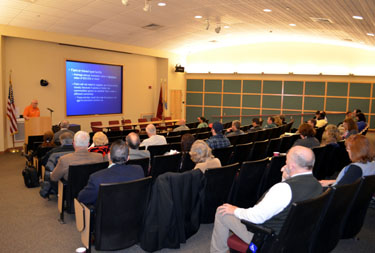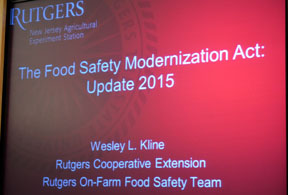Contact: Jeff Beach
(609) 439-2038
jeffrey.beach@ag.state.nj.us
(COLUMBUS, N.J.) -- More than 50 farmers, retailers, educators and regulatory officials who are part of New Jersey and Delaware’s produce industry gathered at the Rutgers EcoComplex to discuss the impending implementation of the federal Food Safety Modernization Act (FSMA) on Monday, March 23.
The consensus opinion: It’s real, it’s coming and all in the produce industry, from the farm to the fork, need to be prepared for it.
“You don’t do food safety because the FDA says FSMA is here and you have to. You don’t do food safety because the retailers say you have to or I’m not going to buy from you. You do food safety to protect your business,” said Dr. Robert Whitaker, Chief Science and Technology Officer for the Produce Marketing Association.

Dr. Wesley Kline speaking at the Information Session
FSMA was passed by Congress in 2010 and signed into law by the President in 2011, following a series of foodborne illnesses linked to fresh produce, everything from spinach to peppers to cantaloupe. It expanded the federal Food and Drug Administration’s (FDA) regulatory authority in the world of food beyond processed and prepared foods to include raw produce on the farm as well.
“We know the growers adhere to GAPs (good agricultural practices), we know they have the (third-party) audits, but we have never before had a regulation covering the growers,” said Jennifer Thomas, the Acting Director of the Compliance Policy Staff in Office of Compliance at the FDA, Center for Food Safety and Applied Nutrition (CFSAN).
The session, sponsored by the Northeast Association of State Departments of Agriculture (NEASDA) and presented by the New Jersey and Delaware Departments of Agriculture, was aimed at further spreading the word to farmers about the looming FSMA mileposts. The first four FDA rules to implement the law – including the Produce Safety regulation, the one most likely to affect farmers – are expected to be finalized in October 2015 and then move quickly to an implementation phase.
After that, farmers, depending upon the size of their farm, will have several years to reach full compliance. Some very small farms may be able to exempt themselves from the law, if they sell a majority of their produce direct-to-the-public. But those who depend upon sales to retail buyers may lose markets if they do not comply.
“For those of you selling less direct-to-the-public and further into the wholesale and retail chain, your adherence to FSMA and that of the wholesalers and retailers you sell to, is vital,” said New Jersey Secretary of Agriculture Douglas H. Fisher, himself a former supermarket owner with 30 years’ experience in the business.
Representatives from both the Ahold USA and Kings Supermarkets chains underscored that sentiment, saying their buying decisions already are influenced by a grower’s adherence to private food-safety auditing firms like Primus Labs. FSMA will bring the force of federal law to bear on those decisions, they said.
Delaware Secretary of Agriculture Ed Kee said he began hauling produce in 1968 and “this is without a doubt the single biggest change I’ve seen to the industry in all that time. The more we work together, the better off we’re going to be.”
To which Connecticut Agriculture Commissioner Steve Reviczky, the current NEASDA President, added, “For all of us in farming and agriculture, FSMA is a game-changer, and it is absolutely necessary we get this right.”
A panel of growers from New Jersey and Delaware topped off the day’s discussions with examples of how they have tried to be proactive in preparing for food safety regulations over the past several years. They agreed that, while it may seem intimidating at first to embark upon a food-safety plan for the farm, an investment of time and money will get farmers there.
“I’d say the most important thing you could do as a farmer is to get together with another farmer who has already done it,” said Chris Wilson, who oversees food safety for the Sorbello and Wheeler Farms in Gloucester County. “Go out to their farm, have them walk you through it, see the things they did. You can do this.”



